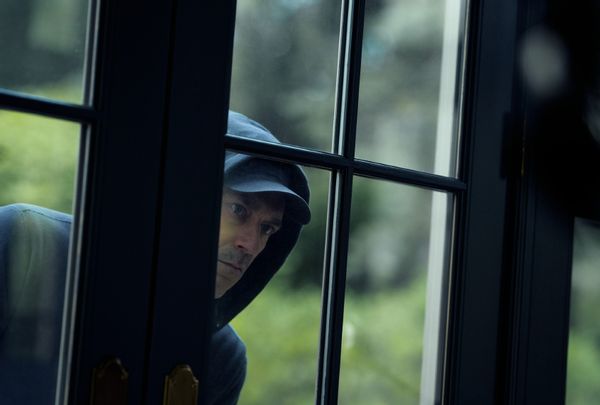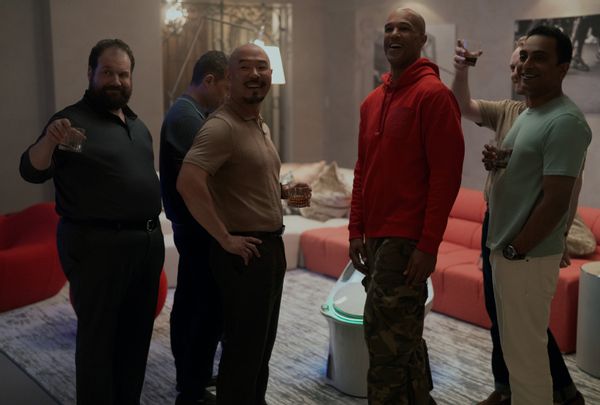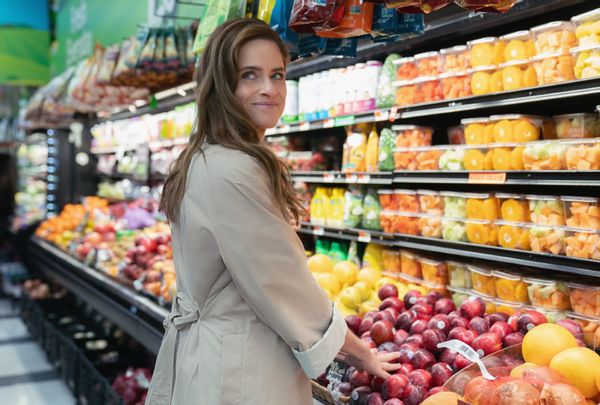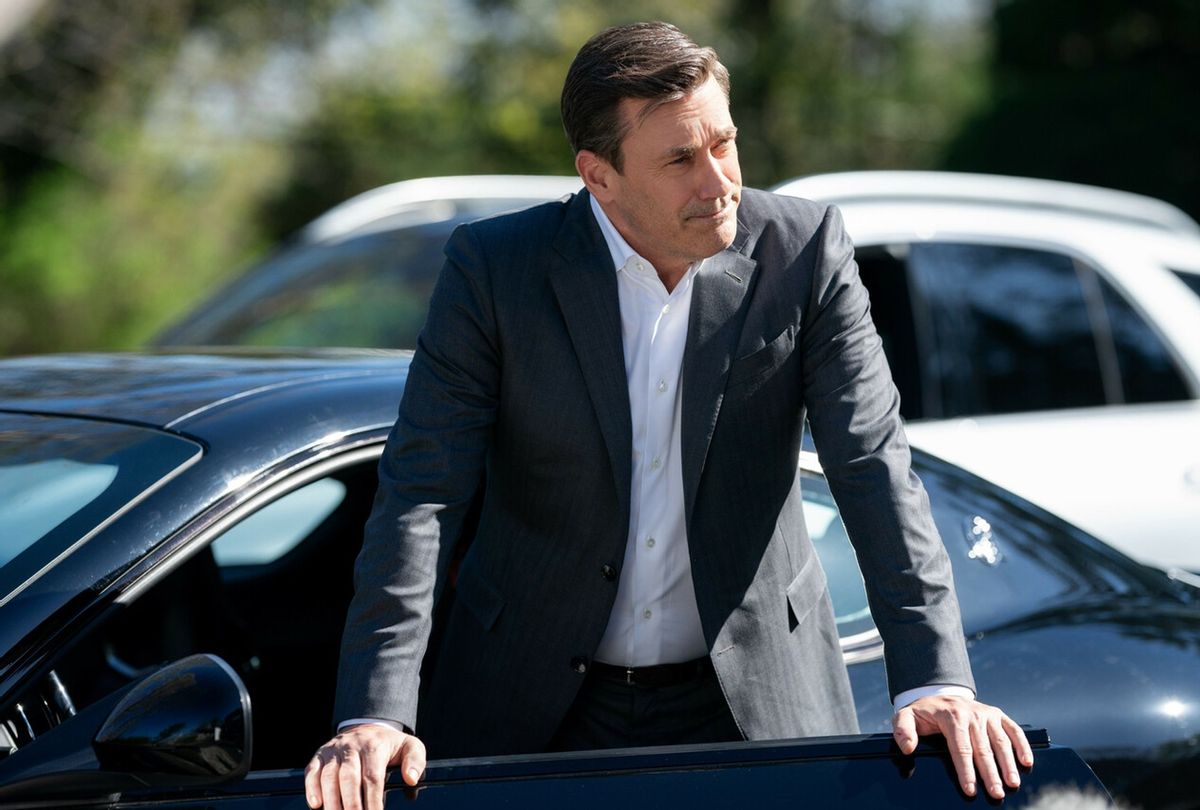It’s tough to shake the feeling that “Your Friends & Neighbors” is selling us something. Some of that is surely unintentional, a matter of its star Jon Hamm’s evergreen association with midcentury ad man Don Draper and “Mad Men.”
Still, his choice to foreground particular aesthetics makes it seem as if series creator Jonathan Tropper purposefully wants to stoke certain urges. Begin with the decision to have Hamm’s dethroned New York hedge fund maestro Andrew Cooper share his secret truths via voiceover: Coop, as his intimates call him, hides his bitter resentment well enough, but the polished flatness of his interior monologue tells another tale.
“Your Friends & Neighbors” has little to share about making money or even keeping it. But it has plenty to pitch concerning the joys and burdens of conspicuous consumption.
Before he becomes a broke rich man, we see him as a hard-working, high-earning financier who scraped his way to a giant house in the tony neighborhood of Westmont Village only to discover his friend Nick (Mark Tallman) boning his wife Mel (Amanda Peet).
Mel and Coop divorce, but the real fortune reversal hits when his firm fires him out of the blue. From there, he does the math: alimony payments, two kids in private schools, multiple car payments, all the fancy bells and whistles of a life that is over-leveraged. With an onerous non-compete benching him for two years, finding another job in his field is out of the question.
One slice of wealth that can’t be repossessed, however, is Coop’s encyclopedic knowledge of top-shelf luxury goods. That comes in handy when he’s casing his neighbors' homes to figure out which ones to burglarize.
“Your Friends & Neighbors” has little to share about making money or even keeping it. But it has plenty to pitch concerning the joys and burdens of conspicuous consumption. Tropper and his writers try to validate our disdain for the greedy while coaxing us to feel something for the people chained to their castles. Not quite sorry; perhaps a few inches shy of empathy. A closer thought is that most people could only wish to have those problems.
Seven of the nine episodes made available for review establish "Your Friends & Neighbors" as one of Tropper’s better TV efforts, although, in the tradition of past shows like "Banshee" and "Warrior," its handsomeness disguises significant creative shortcomings.
That doesn’t make it less watchable – it's certainly that. Nevertheless, if you’re exhausted with voiceover exposition, you’re probably also over in medias res openers, i.e. starting with a scene from the middle of the story before flashing back to the beginning. This show commits both sins, introducing our burglar as he wakes up on his neighbor’s floor, his expensive haircut resting in a puddle of blood.
Since it’s Hamm’s mug and voice doing the trespassing, these cliches are easily forgiven. He’s a familiar type, after all. Where Don Draper sold the mirage of the American dream through products on “Mad Men,” Coop understands that maintaining that illusion takes a mastery of the tiniest, rarest details.
 Jon Hamm in "Your Friends & Neighbors" (Apple TV+). Since he’s secretly penniless, Coop keeps up the posture of affluence. He drinks aged scotch with people he barely likes and eats brunch at the country club he’ll soon be unable to afford. There, his ex and other wives carouse with another soon-to-be divorcee, Sam (Olivia Munn), who Coop is secretly banging.
Jon Hamm in "Your Friends & Neighbors" (Apple TV+). Since he’s secretly penniless, Coop keeps up the posture of affluence. He drinks aged scotch with people he barely likes and eats brunch at the country club he’ll soon be unable to afford. There, his ex and other wives carouse with another soon-to-be divorcee, Sam (Olivia Munn), who Coop is secretly banging.
All the while, he’s surmising what he might gain by rifling through his associates’ drawers and desks. Whenever he discovers some pretty little thing, the frame momentarily transforms into a commercial for excess, with a gleaming image of his unearthed treasure floating onscreen as a heavenly glissando tinkles in the background. Then Coop launches into a meticulous description of what makes each item worth coveting.
One unauthorized visit to someone else's closet yields a brief soliloquy on the implication of a Patek Philippe timepiece.
Hard times haven’t turned us off of upper-class fairy tales.
“Like the ads said, you never actually own the Patek Philippe. You merely look after it for the next generation,” Coop observes in that familiar timbre, his baritone temporarily lifted by the object’s powers of aspirational fulfillment. After a pause, he returns to his usual sullen pitch and adds, “Well, the next generation tells time on their phones, so I figured no one was gonna miss this one.”
Another inspires a short rhapsody detailing the six-figure worth of a Richard Mille Felipe Massa automatic chronograph with a rose gold skeleton and a flyback function. You don’t have to know what those words mean — only notice, perhaps, that the very same dry Chablis voice describing it has spoken for Mercedes-Benz since 2010.
We need your help to stay independent
“Your Friends & Neighbors” is the latest in a miles-long parade of shows about the grossly rich and their hidden miseries, stepping into the recently vacated villa occupied by “The White Lotus” cast of characters. HBO is a veritable warehouse of rich people's tales stretching to the pre- “Sex and the City” era, with “Big Little Lies,” “The Undoing” and “Succession” defining the contemporary generation. Apple TV+ has its share, including “Expats,” another drama about the rich and miserable starring Nicole Kidman, who is fast becoming the oeuvre’s mascot.
With so many similarly themed titles in this expanding portfolio, a common prediction is that we may soon be fed up with the woes of the 1%. We’re lurking on the fringes of recession, financial analysts warn, which would seem to limit our tolerance for, say, listening to Coop’s wealth manager and best friend Barney (Hoon Lee) complain about his wife buying him a Rolls-Royce Spectre.
 Jordan Gelber, Hoon Lee, Mark Tallman and Manu Narayan in "Your Friends & Neighbors" (Apple TV+). But if past habits hold, we may never be done with gawking at the well-heeled. Scan the recent evidence – the third season of “The White Lotus” was a ratings smash. “With Love, Meghan” was far less of one for Netflix, but it launched the Duchess of Sussex’s lifestyle brand, As Ever, with a product line featuring jams and edible flowers that immediately sold out.
Jordan Gelber, Hoon Lee, Mark Tallman and Manu Narayan in "Your Friends & Neighbors" (Apple TV+). But if past habits hold, we may never be done with gawking at the well-heeled. Scan the recent evidence – the third season of “The White Lotus” was a ratings smash. “With Love, Meghan” was far less of one for Netflix, but it launched the Duchess of Sussex’s lifestyle brand, As Ever, with a product line featuring jams and edible flowers that immediately sold out.
Hard times haven’t turned us off of upper-class fairy tales since "Dynasty” became a sensation in the midst of an early ‘80s recession. Its slightly older rival “Dallas” has been credited, somewhat apocryphally, for contributing to the downfall of Romanian president Nicolae Ceaușescu’s repressive regime. Allegedly, Romanians saw an American oil tycoon enjoying easy access to nice cars and other possessions and thought, in so many words, "Why can't that be me?"
Today’s affluence tales uniformly cast the rich as spiritually or morally hollow, something of a condolence prize to viewers living paycheck to paycheck.
A 2008 story in The Washington Post explains that Ceaușescu absurdly believed his people would find the primetime soap to be anti-capitalistic and allowed it to air. “After the dictator and his wife were shot on Christmas Eve 1989,” the story recounts, “the pilot episode of ‘Dallas’ — with a previously censored sex scene edited back in — was one of the first foreign shows broadcast on the liberated Romanian TV.”
Americans aren’t that badly off (yet), but the messaging woven throughout "Your Friends & Neighbors" is a smidge closer to the type of consumerist indictment that Soviet-era autocrat thought he was getting.
Among the wisest of Coop’s early introspections considers the way that the race to acquire status symbols makes you lose sight of the things that once mattered. “You're moving too fast to ask yourself those hard questions like, when is it enough? And really, what's the point of all this s**t?”
 Amanda Peet in "Your Friends & Neighbors" (Apple TV+)“Your Friends & Neighbors” doesn’t entirely counsel against wanting more (and more and more), preferring to speak plainly about what the good life costs in monetary terms. You’d be hard-pressed to find another show as concise in its education concerning the subtler signifiers of having “made it.” And the market for the appearance of success, especially secondhand, is only growing. Coop is risking his lifestyle on that bet.
Amanda Peet in "Your Friends & Neighbors" (Apple TV+)“Your Friends & Neighbors” doesn’t entirely counsel against wanting more (and more and more), preferring to speak plainly about what the good life costs in monetary terms. You’d be hard-pressed to find another show as concise in its education concerning the subtler signifiers of having “made it.” And the market for the appearance of success, especially secondhand, is only growing. Coop is risking his lifestyle on that bet.
Balancing this is the show’s caustic tut-tutting at materialists for wanting these baubles in the first place.
Today’s affluence tales uniformly cast the rich as spiritually or morally hollow, something of a condolence prize to viewers living paycheck to paycheck. When you’re barely making ends meet, you can only wish to be any degree well-off and, therefore, be open to watching why that life comes with its predicaments, mainly having to do with ego. (Most of Coop’s anxieties could be solved by downsizing, but who wants to watch anything that sensible?)
At least Hamm’s poor rich man is somewhat self-aware in this regard. In a moment of dour reflection, Coop admits that he targeted two of the people who live in his community because he didn’t think they deserved all their nice things. He knew plenty of people like them, with houses filled with expensive prizes that would never be missed, “piles of forgotten wealth just lying around in drawers where they were doing no one any good.”
He knows this, he concludes, because only recently he’d been one of them. Few of us will ever afford to gain entry to such circles. But there’s nothing wrong with a little window shopping.
"Your Friends & Neighbors" premieres with two episodes Friday, April 11 on Apple TV+.
Read more
about rich people TV and movies



Shares